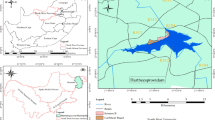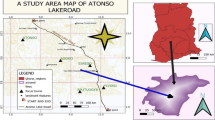Abstract
This research illustrates and analyses the effects of land tenure security on two groups of low-income slum dwellers of Accra (the Ghanaian capital) who have been resettled in 1975 and 1993. The problem of squatting in Accra has been attributed to deficits in housing supply and the high rents of decent accommodation which have left some of the poor with little or no choice but to squat illegally on private or public property. Due to the failure of previous policies to solve the housing problems of the squatters in the capital, this study was conceived to verify the effects of land tenure security and assess the merits of tenure security as an alternative approach to enable low-income residents of the city to improve their housing. Even though tenure security may not be the only condition needed to improve the housing situation of the low-income people of Accra, it can nevertheless be argued that observable improvements and transformations in living conditions have occurred among low-income urbanites that have some sort of tenure security. This research was therefore driven by the central question: to what extent is there a relationship between tenure security and access to housing, and improved living and environmental conditions? A mixed method research design was adopted to draw on relevant information for the research. The study revealed that adequate resettlement of slum dwellers and granting them land tenure security indeed enhanced their access to housing, and improved their living and environmental conditions.








Similar content being viewed by others
References
Abdulai, R. T. (2006). Is land title registration the answer to insecure and uncertain property rights in sub-saharan africa? RICS Research Paper Series, 6(6), 1–27.
Berner, E. (2007). Of slums and gated communities: failures of formal and informal land markets in developing cities. In Fourth Urban Research Symposium, World Bank, Washington DC, 14–16 May 2007.
Brasselle, A. S., Gaspart, F., & Platteau, J. P. (2002). Land tenure security and investment incentives: puzzling evidence from burkina faso. Journal of Development Economics, 67(8), 373–418.
Butcher, C. (1986). Low income housing in Zimbabwe: A case study of Epworth squatter upgrading programme. Department of Rural and Urban Planning, University of Zimbabwe
Columbia University (2003). International studio—Disaster resilient Accra, Ghana. Columbia University, New York. http://www.arch.columbia.edu/Studio/Spring2003/UP/Accra/index.html. Accessed 20 July 2007
Creswell, J. W. (2003). Research design: Qualitative, quantitative and mixed methods approaches (2nd ed.). California: Thousand Oaks/Sage.
Davis, M. (2006). Planet of slums. London: Verso.
de Soto, H. (2000). The mystery of capital: why capitalism triumphs in the west and fails everywhere else. New York: Basic Books.
De Souza, F. A. M. (1999). Land tenure security and housing improvements in Recife, Brazil. Habitat International, 23(1), 19–33. Elsevier Science, New York.
Deininger, K. (2003). Land policies for growth and poverty reduction. Washington: World Bank and Oxford University Press.
Dey, P. D., Sharma, A., & Barman, S. (2006). Land tenure security: is titling enough? New Delhi: National Institute of Urban Affairs (NIUA).
Durand-Lasserve, A. (2006). Informal settlements and the millennium development goals: global policy debates on property ownership and security of tenure. GUD Magazine, 2(1), 1–19.
Durand-Lasserve A. & Payne, G (2006). Evaluating impacts of urban land titling: Results and implications: Preliminary findings. CNRS, Paris and GPA, London
Durand-Lasserve, A., & Royston, L. (Eds.). (2002). Holding their ground: secure land tenure for the urban poor in developing countries. London: Earthscan Publications.
Durand-Lasserve, A., Selod, H. (2007). The formalisation of urban land tenure in developing countries. In 2007 Urban Research Symposium. World Bank, Washington D.C, May 14–16.
Galiani, S., & Shargrodsky, S. (2004). Effects of land titling on child health. Economics and Human Biology, 2, 353–372.
Google (2010). Accra Map. Retrieved 30 March, 2010, from www.nationsonline.org/oneworld/map/google_map_Accra.htm
Grant, R. (2006). Out of place? Global citizens in local spaces: a study of the informal settlements in the Korle Lagoon Environs in Accra, Ghana. Urban Forum, 17(1), 1–24.
Greene, J. C. (2008). Is mixed methods social inquiry a distinctive methodology? Journal of Mixed Methods Research, 2(1), 7–22.
Kagawa, A. (2001). Policy effects and tenure security perceptions of peruvian urban land tenure regularisation policy in the 1990s, ESF/N-AERUS, Leuven. Retrieved 12 November, 2007. http://www.naerus.net/sat/workshops/2001/papers/kagawa.pdf
Kanji, N., Cotula, L., Hilhorst, T., Toulmin, C., & Written, W. (2005). Summary report can land registration serve poor and marginalized groups securing land rights in Africa. Nottingham: Russel Press. International Institute for Environment and Development (IIED).
Kengne, F. F., & Sietchiping, R. (2000). Migration de retour, changementséconomiquesetprédation du milieu dans la campagneproche de Yaoundé. Revue de Géographie du Cameroun, 14(2), 209–233.
Lefebvre, H. (1974). Le Droit a la Ville Suivi de EspaceetPolitique. Paris: Anthropos.
Mertens, D. M. (2005). Research and evaluation in education and psychology: intergrating diversity with quantitative, qualitative, and mixed methods (2nd ed.). Thousand Oaks: Sage Publications.
Nawagamuwa, A., Viking, N. (2003). Slums, squatter areas and informal settlements—Do they block or help urban sustainability in developing context? In 9th International Conference on Sri Lanka Studies. Matara, Sri Lanka, 28–30 November, 2003.
Obudho, R. A., & Mhlanga, C. C. (1988). Planning strategies for slum and squatter settlements in sub-saharan africa. In R. A. Obudho & C. Mhlanga (Eds.), Slum and squatter settlements in Sub-Saharan Africa: toward a planning strategy. NewYork: Praecer.
Payne, G. (2001). Urban land tenure policy options: titles or rights? Habitat International, 25, 415–429.
Payne, G. (2002). Secure tenure for the urban poor. In Round Table Seminar Organised by Cities Alliance, Washington, D.C, 23 May, 2002
Payne, G, Durand-Lasserve, A &Rakodi, C 2007, Social and Economic Impacts of Land Titling Programmes in Urban and Peri-urban Areas: A Review of the Literature. In World Bank Urban Research Symposium, Washington DC, 14–16 May, 2007
Place, F. (2005). Land tenure and agricultural productivity in africa: A comparative analysis of economic theory, empirical results, and policy statements. Nairobi, Kenya: World Agroforestry Centre.
Place, F. (2009). Land tenure and agricultural productivity in Africa: A comparative analysis of economic literature and recent policy strategies and reforms. World Development, 37(8), 1326–1336.
Place, F., Roth, M., & Hazell, P. (1994). Land tenure security and agricultural performance: Overview of research methodology. In Bruce John & Migot-Adholla Shem (Eds.), Searching for land tenure security in Africa. Dubuque, IA: Kendall/Hunt.
Rempel, M. (1996). Systems theory and power/knowledge: a foucauldian reconstruction of Niklasluhmann’s systems theory. International Journal of Sociology and Social Policy, 16(4), 58–90.
Sietchiping, R 2005, Prospective slum policies: Conceptualisation and implementation of a proposed informal settlement growth. In Third Urban Symposium on Land Development, Urban Policy and Poverty Reduction, Brazilia, DF, 4–6 April 2005
Sosulski, M. R., & Lawrence, C. K. (2008). Mixing methods for full-strength results two welfare studies. Journal of Mixed Methods Research, 2(2), 121–148.
UN-Habitat (2002). Expert Group Meeting on Urban Indicators: Secure Tenure, Slums and Global Sample of Cities, Revised Draft Report, Nairobi.
UN-Habitat (2003) The Challenge of Slums. Nairobi: UN.
UN-Habitat. (2007). Sustainable urbanization: Local action for urban poverty reduction, emphasis on finance and planning. In Twenty First Session of the Governing Council. Nairobi, Kenya: UN-Habitat. 16–20 April, 2007.
van Asperen, P., & Zevenbergen, J. (2007). Can Lessons be Learnt from Improving Tenure Security in Informal Settlements? in ENHR 2007 International Conference on Sustainable Urban Areas. Rotterdam, Netherlands: ENHR. 25–28 June, 2007.
Werlin, H. (1999). The slum upgrading myth. Urban Studies, 36(9), 1523–1534.
Zikmund, W. G. (1997). Business research methods. Florida: Dryden Press.
Author information
Authors and Affiliations
Corresponding author
Rights and permissions
About this article
Cite this article
Nyametso, J.K. Resettlement of Slum Dwellers, Land Tenure Security and Improved Housing, Living and Environmental Conditions at Madina Estate, Accra, Ghana. Urban Forum 23, 343–365 (2012). https://doi.org/10.1007/s12132-011-9137-6
Published:
Issue Date:
DOI: https://doi.org/10.1007/s12132-011-9137-6




